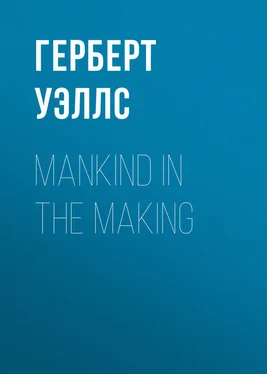Герберт Уэллс - Mankind in the Making
Здесь есть возможность читать онлайн «Герберт Уэллс - Mankind in the Making» — ознакомительный отрывок электронной книги совершенно бесплатно, а после прочтения отрывка купить полную версию. В некоторых случаях можно слушать аудио, скачать через торрент в формате fb2 и присутствует краткое содержание. Жанр: Философия, foreign_prose, на английском языке. Описание произведения, (предисловие) а так же отзывы посетителей доступны на портале библиотеки ЛибКат.
- Название:Mankind in the Making
- Автор:
- Жанр:
- Год:неизвестен
- ISBN:нет данных
- Рейтинг книги:4 / 5. Голосов: 1
-
Избранное:Добавить в избранное
- Отзывы:
-
Ваша оценка:
- 80
- 1
- 2
- 3
- 4
- 5
Mankind in the Making: краткое содержание, описание и аннотация
Предлагаем к чтению аннотацию, описание, краткое содержание или предисловие (зависит от того, что написал сам автор книги «Mankind in the Making»). Если вы не нашли необходимую информацию о книге — напишите в комментариях, мы постараемся отыскать её.
Mankind in the Making — читать онлайн ознакомительный отрывок
Ниже представлен текст книги, разбитый по страницам. Система сохранения места последней прочитанной страницы, позволяет с удобством читать онлайн бесплатно книгу «Mankind in the Making», без необходимости каждый раз заново искать на чём Вы остановились. Поставьте закладку, и сможете в любой момент перейти на страницу, на которой закончили чтение.
Интервал:
Закладка:
These considerations alone would suffice to make us very suspicious of the philanthropic method of direct assistance, so far as the remedial aspect goes. But there is another more sweeping and comprehensive objection to this method. Philanthropic institutions, as a matter of fact, rarely succeed in doing what they profess and intend to do.
I do not allude here to the countless swindlers and sham institutions that levy a tremendous tribute upon the heedless good. Quite apart from that wastage altogether, and speaking only of such bonâ fide institutions as would satisfy Mr. Labouchere, they do not work. It is one thing for the influential and opulent inactive person of good intentions to provide a magnificent building and a lavish endowment for some specific purpose, and quite another to attain in reality the ostensible end of the display. It is easy to create a general effect of providing comfort and tender care for helpless women who are becoming mothers, and of tending and training and educating their children, but, in cold fact, it is impossible to get enough capable and devoted people to do the work. In cold fact, lying-in hospitals have a tendency to become austere, hard, unsympathetic, wholesale concerns, with a disposition to confuse and substitute moral for physical well-being. In cold fact, orphanages do not present any perplexing resemblance to an earthly paradise. However warm the heart behind the cheque, the human being at the other end of the chain is apt to find the charity no more than a rather inhuman machine. Shining devotees there are, but able, courageous, and vigorous people are rare, and the world urges a thousand better employments upon them than the care of inferior mothers and inferior children. Exceptionally good people owe the world the duty of parentage themselves, and it follows that the rank and file of those in the service of Charity falls far below the standard necessary to give these poor children that chance in the world the cheque-writing philanthropist believes he is giving them. The great proportion of the servants and administrators of Charities are doing that work because they can get nothing better to do – and it is not considered remarkably high-class work. These things have to be reckoned with by every philanthropic person with sufficient faith to believe that an enterprise may not only look well, but do well. One gets a Waugh or a Barnardo now and then, a gleam of efficiency in the waste, and for the rest this spectacle of stinted thought and unstinted giving, this modern Charity, is often no more than a pretentious wholesale substitute for retail misery and disaster. Fourteen million pounds a year, I am told, go to British Charities, and I doubt if anything like a fair million’s worth of palliative amelioration is attained for this expenditure. As for any permanent improvement, I doubt if all these Charities together achieve a net advance that could not be got by the discreet and able expenditure of ten or twelve thousand pounds.
It is one of the grimmest ironies in life, that athwart the memory of sainted founders should be written the most tragic consequences. The Foundling Hospital of London, established by Coram – to save infant lives! – buried, between 1756 and 1760, 10,534 children out of 14,934 received, and the Dublin Foundling Hospital (suppressed in 1835) had a mortality of eighty per cent. The two great Russian institutions are, I gather, about equally deadly with seventy-five per cent., and the Italian institutes run to about ninety per cent. The Florentine boasts a very beautiful and touching series of putti by Delia Robbia, that does little or nothing to diminish its death-rate. So far from preventing infant murder these places, with the noblest intentions in the world, have, for all practical purposes, organized it. The London Foundling, be it noted, in the reorganized form it assumed after its first massacres, is not a Foundling Hospital at all. An extremely limited number of children, the illegitimate children of recommended respectable but unfortunate mothers, are converted into admirable bandsmen for the defence of the Empire or trained to be servants for people who feel the need of well-trained servants, at a gross cost that might well fill the mind of many a poor clergyman’s son with amazement and envy. And this is probably a particularly well-managed charity. It is doing all that can be expected of it, and stands far above the general Charitable average.
Every Poor Law Authority comes into the tangles of these perplexities. Upon the hands of every one of them come deserted children, the children of convicted criminals, the children of pauper families, a miscellaneous pitiful succession of responsibilities. The enterprises they are forced to undertake to meet these charges rest on taxation, a financial basis far stabler than the fitful good intentions of the rich, but apart from this advantage there is little about them to differentiate them from Charities. The method of treatment varies from a barrack system, in which the children are herded in huge asylums like those places between Sutton and Banstead, to what is perhaps preferable, the system of boarding-out little groups of children with suitable poor people. Provided such boarded-out children are systematically weighed, measured and examined, and at once withdrawn when they drop below average mental and bodily progress, it would seem more likely that a reasonable percentage should grow into ordinary useful citizens under these latter conditions than under the former.
It is well, however, to anticipate a very probable side result if we make the boarding out of pauper children a regular rural industry. There will arise in many rural homes a very strong pecuniary inducement to limit the family. Side by side will be a couple with eight children – of their own, struggling hard to keep them, and another family with, let us say, two children of their own blood and six “boarded-out,” living in relative opulence. That side consequence must be anticipated. For my own part and for the reasons given in the second of these papers, I do not see that it is a very serious one so far as the future goes, because I do not think there is much to choose between the “heredity” of the rural and the urban strain. It is nonsense to pretend that we shall get the fine flower of the cottage population to board pauper children; we shall induce respectable inferior people living in healthy conditions to take care of an inferior sort of children rescued from unhealthy disreputable conditions – that is all. The average inherent quality of the resultant adults will be about the same whichever element predominates.
Possibly this indifference may seem undesirable. But we must bear in mind that the whole problem is hard to cope with, it is an aspect of failure, and no sentimental juggling with facts will convert the business into a beautiful or desirable thing. Somehow or other we have to pay. All expedients must be palliatives, all will involve sacrifices; we must, no doubt, adopt some of them for our present necessities, but they are like famine relief works, to adopt them in permanence is a counsel of despair.
Clearly it is not along these lines that the capable men-makers we suppose to be attacking the problem will spend much of their energies. All the experiences of Charities and Poor-Law Authorities simply confirm our postulate of the necessity of a standard of comfort if a child is to have a really good initial chance in the world. The only conceivable solution of this problem is one that will ensure that no child, or only a few accidental and exceptional children, will be born outside these advantages. It is no good trying to sentimentalize the issue away. This is the end we must attain, to attain any effectual permanent improvement in the conditions of childhood. A certain number of people have to be discouraged and prevented from parentage, and a great number of homes have to be improved. How can we ensure these ends, or how far can we go towards ensuring them?
Читать дальшеИнтервал:
Закладка:
Похожие книги на «Mankind in the Making»
Представляем Вашему вниманию похожие книги на «Mankind in the Making» списком для выбора. Мы отобрали схожую по названию и смыслу литературу в надежде предоставить читателям больше вариантов отыскать новые, интересные, ещё непрочитанные произведения.
Обсуждение, отзывы о книге «Mankind in the Making» и просто собственные мнения читателей. Оставьте ваши комментарии, напишите, что Вы думаете о произведении, его смысле или главных героях. Укажите что конкретно понравилось, а что нет, и почему Вы так считаете.












